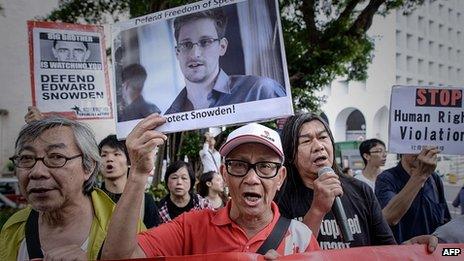Snowden is 'not on plane' to Cuba in Ecuador asylum bid
- Published
- comments

The location of former US intelligence contractor Edward Snowden is unclear after a flight he was expected to take from Russia apparently left without him on board.
Reports suggested he would fly to the Cuban capital Havana on his way to Ecuador where he is seeking asylum.
US Secretary of State John Kerry has called him a "traitor to his country".
Mr Snowden initially fled to Hong Kong after leaking secret documents about US internet and phone surveillance.
'Face justice'
Mr Snowden flew from Hong Kong to Russia on Sunday. Hong Kong's government said Mr Snowden left the city voluntarily.
But Albert Ho, his lawyer in Hong Kong, told the BBC that a government official urged Mr Snowden to go over the weekend. Mr Ho said he believed the official was acting on the orders of the Beijing government.
He added that his client was given assurances that he would be allowed to leave freely.
A flight to Havana, which Mr Snowden had been expected to board on Monday, departed late from Moscow's Sheremetyevo airport.
Journalists on the plane said there was no sign of the fugitive former intelligence contractor.
An Aeroflot airline worker, who asked not to be named, told Associated Press news agency that Mr Snowden was not on the flight.
The US state department has urged countries in the "Western Hemisphere" not to let him enter their territory.
Washington said it expected the Russian government to "look at all options available" to transfer him to the US to face spying charges - but Russia reportedly said it has "no grounds" to do so.
"We expect the Russian government to look at all options available to expel Mr Snowden back to the US to face justice for the crimes with which he is charged," Caitlin Hayden, US National Security Council spokeswoman, said on Sunday.
She highlighted "intensified co-operation" between the US and Russia after the Boston Marathon bombings in April and their record of working together on law enforcement matters.
Passenger on flight SU213: "It's strange, because they were getting luggage straight from the airplane and putting it into the car"
But Russia's Interfax news agency quoted an unnamed Russian source as saying: "Snowden has not committed any crimes on Russian territory.
"In addition, Russian law-enforcement agencies have received no instructions through Interpol to detain him. So we have no grounds to detain this transit passenger."
The US had been trying to extradite Mr Snowden from Hong Kong, but authorities there said the US request was incomplete and there was no legal basis to stop him from departing.
The US justice department said it was "disappointed" that Hong Kong did not arrest Mr Snowden and that it "disagrees" with its reasons for not doing so.
"We find their decision to be particularly troubling," an official said.
Mr Snowden had been expected to fly first to Cuba and then to Venezuela before heading to Ecuador to avoid any country that might arrest him on behalf of the US.
'Escorted by diplomats'
Ecuadorian Foreign Minister Ricardo Patino: "We take care of human rights"
Ecuador's Foreign Minister Ricardo Patino said on Monday that Mr Snowden's asylum request was being "analysed".
Ecuador is already giving political asylum to Wikileaks founder Julian Assange, who has been sheltering in its London embassy for the past year.
Wikileaks is now supporting Mr Snowden and said in a statement that he was "bound for the Republic of Ecuador via a safe route for the purposes of asylum, and is being escorted by diplomats and legal advisers from Wikileaks".
Although the US and Ecuador have a joint extradition treaty, it is not applicable to "crimes or offences of a political character".
Mr Snowden left his home in Hawaii after leaking details of his work as an NSA (National Security Agency) contractor and the extensive US surveillance programme to the UK's Guardian newspaper and the Washington Post.
Wikileaks spokesperson Kristinn Hrafnsson told the BBC he believed the fugitive would eventually be recognised as a hero
He has been charged in the US with theft of government property, unauthorised communication of national defence information and wilful communication of classified communications intelligence.
Each of the charges carries a maximum 10-year prison sentence.
The Obama administration is desperate to get its hands on Mr Snowden before he reveals any more secrets, says the BBC's Paul Adams in Washington.
Mr Snowden's leaks have led to revelations that the US is systematically seizing vast amounts of phone and web data under an NSA programme known as Prism.
US officials have defended the practice of gathering telephone and internet data from private users around the world.
They say Prism cannot be used to intentionally target any Americans or anyone in the US, and that it is supervised by judges.